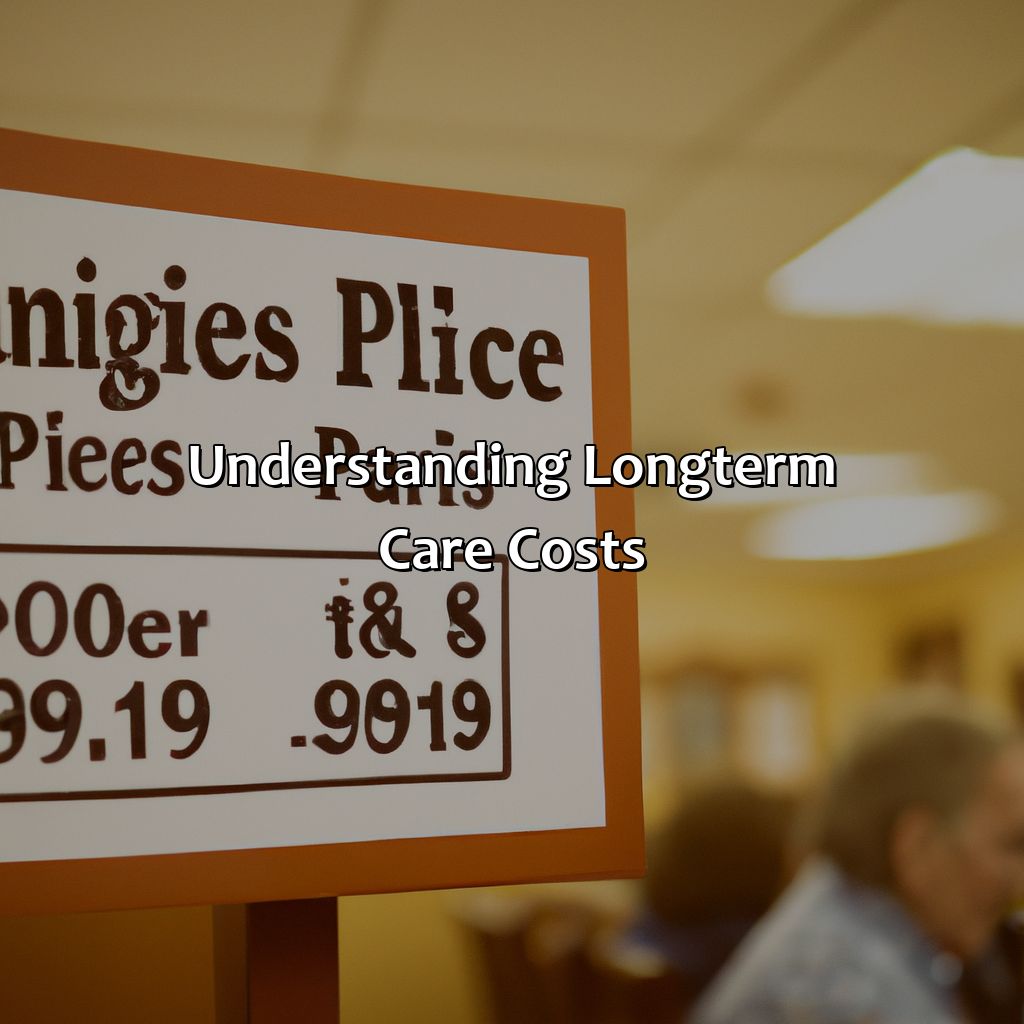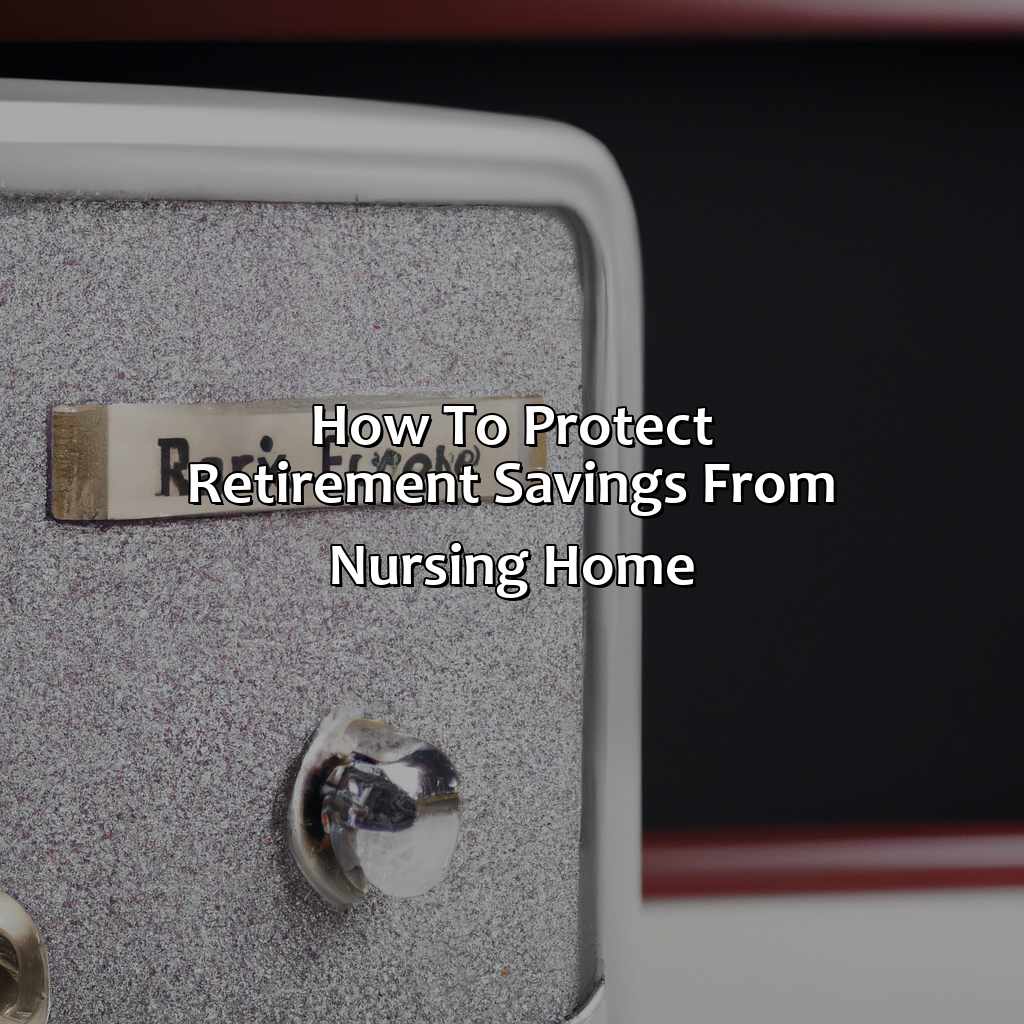How To Protect Retirement Savings From Nursing Home?
Key Takeaway:
- Long-term care costs can significantly impact retirement savings: Understanding the costs associated with nursing home care is crucial for protecting your retirement savings. With nursing home care expenses averaging around $7,000 per month, it is essential to plan accordingly.
- Insurance coverage and Medicaid can help mitigate nursing home care expenses: Having appropriate insurance coverage and understanding Medicaid qualification rules can help alleviate nursing home care expenses. It is important to research and understand which options are available.
- Investment strategies, estate planning, and seeking professional advice are key to protecting retirement savings: By exploring investment strategies and estate planning tools such as trusts, individuals can help protect their retirement savings from nursing home expenses. Seeking professional advice from financial planners and attorneys who specialize in elder law can provide helpful guidance and peace of mind.
Are you concerned about protecting your retirement savings from nursing home costs? This article will provide you with essential tips to help you safeguard your hard-earned savings. You’ll learn how to create a financially secure retirement while maintaining a stable quality of life.
Understanding Long-term Care Costs
Long-Term Care Costs: Professional Guidelines and Recommendations
Long-term care costs can pose a serious financial challenge for individuals, particularly for those nearing retirement age. Understanding the nature and extent of these costs is crucial for developing a comprehensive plan for protecting one’s retirement savings. In this article, we provide professional guidelines and recommendations for navigating the landscape of long-term care costs.
When it comes to long-term care costs, there are many factors to consider. These include the type of care needed (e.g., in-home care, assisted living, or nursing home), the length of care required, the state of residence, and the individual’s health status and level of disability. Additionally, the cost of long-term care can vary widely depending on geographic region, with some areas being more expensive than others.
One key strategy for managing long-term care costs is to purchase long-term care insurance. Long-term care insurance can help cover the costs of care in the event that an individual becomes disabled and requires ongoing assistance with daily activities. Other strategies may include utilizing government-funded programs, such as Medicaid or Veterans Affairs, or relying on personal savings or investments.
A true story that illustrates the importance of planning ahead for long-term care costs is that of John and Mary, a retired couple living in a high-cost area of the country. Despite having significant retirement savings, they did not plan for the potential need for long-term care and did not purchase long-term care insurance. When Mary developed Alzheimer’s disease and required round-the-clock care, their savings were quickly depleted. This scenario serves as a cautionary reminder of the importance of understanding and planning for long-term care costs.

Image credits: retiregenz.com by James Jones
Nursing Home Care Expenses
Ensure your retirement savings are safe from nursing home expenses. Grasp the complex world of insurance coverage and Medicaid rules. Sub-sections, insurance coverage and Medicaid rules & qualifications, give you the facts and solutions to protect your retirement savings.

Image credits: retiregenz.com by James Washington
The Role of Insurance Coverage
Insurance Plays a Crucial Role in Protecting Retirement Savings from Nursing Home Expenses. Long-term care insurance can protect against the significant costs of nursing home care, which can quickly deplete retirement savings. It is advisable to consider this type of insurance when planning for retirement.
Further, many policies offer additional benefits that cater to the needs of specific individuals. For instance, some provide coverage for in-home care or assisted living facilities that could be more suitable for some individuals than nursing homes.
Moreover, it is essential to compare different policies and their costs and features before purchasing one. Understanding policy jargon and seeking expert advice would also help make informed decisions before purchasing a plan.
Investing in long-term care insurance can save substantial expenses in the future while ensuring appropriate support in case of need.
Overall, choosing an adequate insurance policy plays a vital role in protecting savings. Medicaid rules are like a game of Jenga, one wrong move and your retirement savings are in jeopardy.
Medicaid Rules and Qualifications
To secure retirement savings from nursing home care expenses, understanding Medicaid regulations and eligibility criteria is key. Medicaid provides benefits to individuals with limited financial resources, including long-term care facilities. To qualify for Medicaid in most states, individuals must have income below a certain level and meet asset limits.
Asset limits can present challenges for those looking to protect their retirement savings. However, there are legal strategies, such as trusts or gifting assets, that can help individuals qualify while preserving assets. It’s important to seek guidance from an experienced attorney who specializes in Medicaid planning.
In addition to eligibility requirements, it’s important to understand the application process and deadlines. Failure to comply with application deadlines or provide accurate information can result in denial of benefits or delays in processing.
Protecting retirement savings from nursing home expenses requires advanced planning and knowledge of the complex rules and regulations of Medicaid. Don’t wait until it’s too late – consult with a professional today to learn about your options before facing long-term care expenses.
Protect your retirement savings like it’s your grandkid’s college fund – because let’s face it, nursing homes aren’t cheap.
Protecting Your Retirement Savings from Nursing Home Expenses
Secure your retirement savings from nursing home costs! You must know different investment tactics and estate planning alternatives. Here, discover the solution to protect your retirement funds with two sub-sections. Namely:
- Investment Strategies for Retirement Savings
- Estate Planning & Asset Protection Tools

Image credits: retiregenz.com by Harry Arnold
Investment Strategies for Retirement Savings
Investing smartly in Retirement Savings is crucial to ensure financial stability in old age. There are various tactics individuals can adopt to guarantee secure post-retirement funds. These include:
- Diversifying investments across stocks, bonds and real estate
- Seeking long-term channelizing of savings
- Periodic market evaluation for tracking your retirement goals
One way to protect Retirement Savings from Nursing Home expenses is by opening a Long-Term Care Insurance policy that will cover most potential nursing home costs. For investment security, individuals should invest with an eye on the long-term horizon, adhering to high liquidity and low risk principles. Investing in low-fee mutual funds or exchange-traded funds (ETFs) with exposure to local and global markets is also an excellent strategy as they offer broad diversification across multiple asset classes.
Another strategy one could deploy is earmarking separate accounts dedicated exclusively for healthcare-related expenditures. Health Savings Accounts (HSAs), in particular, come with pre-tax contributions and triple tax benefits consequently boosting returns while serving as a source of emergency funding when required.
Without such protective measures in place, medical bills can quickly deplete Retirement Savings accounts leading to ruinous circumstances where seniors run out of money before passing away back then decreasing their standards of living dangerously or even impacting their quality of life.
With an eye on long-term strategies and diverse investment portfolios for your health care expenses, retirees have better chances at securing their golden years’ finances for future needs. Secure your assets with the right estate planning tools, because heirs have enough drama to deal with without a battle over your belongings.
Estate Planning and Asset Protection Tools
Optimizing inheritance and safeguarding assets from care costs necessitates the use of resources such as trust arrangements, insurance mechanisms, and proactive estate planning which can impact asset allocation through different strategies. While a revocable living trust may provide income, protect future inheritances from probate expenses, irrevocable trusts could help manage wealth transfer patterns during life in compliance with Medicaid qualifications. Annuities too offer benefit reach to long-term care policies while protecting assets from nursing home death expenses.
For those whose finances do not classify them for lengthy coverage protection plans or need immediate multi-year aid and support in nursing facilities without loss of estates; it’s best to consider business organization techniques like forming limited liability companies (LLCs), isolating benign properties from debt liabilities and ensuing legal separation practices. It’s also important to note that asset protection actions must be executed well ahead of when you actually need Medicaid-protected homes – typically five years before entering the nursing facility.
Seeking Professional Advice for Nursing Home Planning
Retirement planning is crucial, but it is equally important to plan for potential nursing home expenses. Seeking professional advice for eldercare financial planning is essential to protect one’s retirement savings. An expert in eldercare planning can assess one’s current financial situation, long-term care insurance, and health care needs, and suggest suitable options for the future. It is advisable to seek advice from a specialist, such as an elder law attorney or financial planner/wealth manager who has experience in this kind of planning to secure one’s retirement funds from nursing home expenses.
In addition, certain government programs such as Medicaid and Veterans Affairs offer financial assistance for those who meet their eligibility criteria. Consulting with an elder law attorney can help one navigate the complex government regulations and understand the laws governing Medicaid and Veterans Affairs benefits. By understanding the different options available, one can make more informed decisions to protect their retirement savings from nursing home expenses.
It is important to note that Medicare does not cover long-term care expenses. According to a recent report by the American Association of Retired Persons (AARP), nearly 80 percent of Americans over the age of 50 incorrectly believe that Medicare pays for long-term care expenses.
According to Forbes, nursing homes can cost up to $8,000 a month. It is crucial to take preemptive measures to secure one’s retirement funds and avoid the financial burden of nursing home expenses.

Image credits: retiregenz.com by Harry Washington
Five Facts About How To Protect Retirement Savings From Nursing Home:
- ✅ Nursing home care can be expensive, with costs ranging from $50,000 to over $100,000 per year. (Source: AARP)
- ✅ Medicare and Medicaid have different rules for covering nursing home costs, and it is important to understand the differences. (Source: Investopedia)
- ✅ Creating a trust or setting up an annuity can help protect retirement savings from being depleted by nursing home costs. (Source: NerdWallet)
- ✅ Long-term care insurance can also help cover nursing home costs, but it is important to choose a policy with adequate coverage and understand the limitations. (Source: The Balance)
- ✅ Planning ahead and consulting with a financial advisor can be crucial in protecting retirement savings from nursing home costs. (Source: Forbes)
FAQs about How To Protect Retirement Savings From Nursing Home?
How can I protect my retirement savings from nursing home costs?
One way to protect your retirement savings from nursing home costs is to purchase long-term care insurance. This type of insurance can cover the costs associated with institutional care, including nursing home expenses. Another option is to create a trust, such as an irrevocable trust, which can protect your assets from being considered when determining eligibility for Medicaid.
What is Medicaid, and how can it affect my retirement savings?
Medicaid is a government-funded program that provides healthcare coverage to those who meet certain financial and medical criteria. If you require nursing home care, Medicaid may add to or completely cover your medical expenses, but you often have to exhaust most of your assets before you can qualify for the program. This can potentially deplete your retirement savings if not planned for properly.
Can I protect my retirement savings if I don’t have long-term care insurance or a trust?
Yes, there are other ways to protect your retirement savings from nursing home costs. One method is to set up financial power of attorney with a trusted individual. This would give them the authority to manage your finances and make decisions on your behalf if you become incapacitated. They can then make decisions on your behalf to protect your savings. Another option is to create a written plan with an attorney that outlines your wishes regarding long-term care and how your assets should be managed.
What should I consider when choosing long-term care insurance?
When choosing long-term care insurance, consider the following factors:
- The cost of the policy
- What the policy covers and what it excludes
- The maximum benefit amount and duration of coverage
- The insurer’s reputation and financial stability
- The policy’s inflation protection features
- Any restrictions or waiting periods for coverage
When should I start planning for nursing home costs?
You should start planning for nursing home costs as early as possible, ideally in your 50s or 60s. This will give you more time to save and potentially purchase long-term care insurance or create a trust. It’s also important to consider your health and family medical history when planning for the future.
Can I make changes to my retirement savings plan if I’ve already retired?
Yes, it is possible to make changes to your retirement savings plan even if you’ve already retired. This may include reallocating assets, adjusting your savings contributions, investing in different funds, or purchasing long-term care insurance later in life. It’s important to discuss any changes with a financial advisor to ensure they align with your retirement goals.






